Kris' Books.
Female. Slavic mind. Avid reader.
I read across a broad range of book genres, with an emphasis on Aus/NZ lit, Russian and Ukrainian literature, Latin-American literature and European history.
 Being a person who gets ’clingy’ to various things during depressing times, but not really addicted in the true sense of the word, I have wondered possibly too often about what makes me reach the state where I feel that I am dependent on a particular activity or object in order to feel the most basic form of happiness. Self-pity, I conclude, is the main culprit. Mind, I can't convince myself that that's all there is to it. After all, why do I continue to get stupid attachments if I've got it all figured out how to prevent them?
Being a person who gets ’clingy’ to various things during depressing times, but not really addicted in the true sense of the word, I have wondered possibly too often about what makes me reach the state where I feel that I am dependent on a particular activity or object in order to feel the most basic form of happiness. Self-pity, I conclude, is the main culprit. Mind, I can't convince myself that that's all there is to it. After all, why do I continue to get stupid attachments if I've got it all figured out how to prevent them?Enter this book. Be introduced to a man of respectable, educated origin, demeanour and occupation, who has a family, money and respect. During the fifteenth year of his marriage, he starts to quarrel with his wife, whom he has begun to call by "too damned efficient", and he has begun to have issues with his business. One fine day he shares a bottle of wine given by a friend of his over dinner with his wife (after a quarrel of course). Inexplicably, having been a man who formerly drank beer only occasionally, he suddenly acquires an unquenchable thirst for alcohol, seeing it only as an escape from his multiplying troubles.
"That glass and a half of musty red wine could not have had such a great effect on a sober man like me; and yet, the alcohol transformed the whole world for me. It made me believe there was no estrangement, no quarrel between Magda and myself; it changed my business troubles into successes, such successes that I had 100 marks to give away, not a considerable sum of course, but in my position, no sum of money was quite inconsiderable...Not only had I deceived [Magda] about the state of my business affairs, but I had fortified this deceit with the gift of money...Ah yes, it was alcohol that made me do it. When once I had understood, when once I had realised to the full, what a liar alcohol was, and what liars it makes of honest men, I swore to never to touch a drop, even to give up my occasional glass of beer".
Ah, the folly of self-promises like these. Sadly, Herr Sommer's affair with alcohol does not end here. His psychological and physical demise escalates to enormous proportions, without a single chance for repentance until his self-inflicted, maniac end. However, the speed of his journey varied. When he was spiting his wife his degradation and self-damage accelerated, but when he had been thoroughly weaned and scared off alcohol by the horrors of prison and mental patient rehabilation, as well as filled with hope by the idea that his wife would rescue him, it came to a standstill. The main thing I learned from the story, I suppose, was that addiction is a result of pride and lying to oneself, and refusal to seek help when you need it the most. Why not seek help, as he correctly asked himself. Because your helpers are the very people who epitomise everything you are not at the miserable state you've gotten yourself into.
 After reading this book I'm not quite certain whether to classify this book as belonging to the autobiography/memoir genre or adventure genres. Undoubtedly it has to be some sort of autobiography because the author is writing about himself and is reflecting on personal experiences, however with the sailor-style swearing and suspense the autobiography label seems to be an illusion, however the absence of over-the-top drama certainly suspends it from any affiliation with the adventure genre. In short, this is not an autobiography of an influential person, polished with niceties and harmonious writing- it is the reflections of an experienced seaman, itty gritty reality. If you want to read a book worthy of a writing award, this is not for you, but if you're interested in what would pull a young man from a good family to a precarious crime such as stealing a yacht and sailing it halfway across the world, you won't be disappointed.
After reading this book I'm not quite certain whether to classify this book as belonging to the autobiography/memoir genre or adventure genres. Undoubtedly it has to be some sort of autobiography because the author is writing about himself and is reflecting on personal experiences, however with the sailor-style swearing and suspense the autobiography label seems to be an illusion, however the absence of over-the-top drama certainly suspends it from any affiliation with the adventure genre. In short, this is not an autobiography of an influential person, polished with niceties and harmonious writing- it is the reflections of an experienced seaman, itty gritty reality. If you want to read a book worthy of a writing award, this is not for you, but if you're interested in what would pull a young man from a good family to a precarious crime such as stealing a yacht and sailing it halfway across the world, you won't be disappointed.Predictably, Fridjhon's motivation which led him to crime began from a small inner corruption in his sense of morality. When he was asked by the Romanian immigrant Mihai, who he met while hitchhiking across the United States, whether he would approve of criminal activity, he replied, "Depends on the type of crime, I guess", which eventually turned into, "Not really, but maybe, if the circumstances dictated it. Like if the insurance company cheated me, I suppose, or if I really needed money for an operation our something". Fridjhon had judged by appearance that his new acquaintance Mihai wasn't in a very poor financial situation, but he seemed to have forgotten that appearances are just about useless in describing the actual character of the person being dealt with.
At first Mihai offered a plan of stealing a yacht to claim the insurance money, which after some serious thought Fridjhon accepted because he reckoned it didn't violate his life philosophy that "You can anything in this life as long as you don't harm anybody else". In his opinion, the scheme wouldn't effectively harm anyone because insurance companies don't really hold any moral principles, being simply individual shareholders who earn large sums by their own economic principles. I was really surprised that he, an experienced seaman, did not immediately consider the sentimental consequences of stealing someone else's yacht. Even supposing that the owner would be refunded by the insurance company for the stolen property, wouldn't he feel some sort of sentimental loss? Isn't that harmful in a way? In my opinion it is. That's why I did not pity Fridjhon when his dealings with Mihai, "that life-affirming kick I'd set out to find when I left South Africa", blew out of control as a result of the Eastern European gangsters' manipulations with him.
In summary I really enjoyed the book. Although I wish Fridjhon could have written a more effective summary in this autobiography, I apppreciated the extensive dialogue and detail he included in the writing- I have not read many autobiographies whose authors strain their memories so much. In my opinion, I thought it was a really compelling tale of endurance and learning several life lessons in a relatively short period of time, whilst enduring the impact of the blow. Perhaps the aspect I enjoyed the most were the references to the yacht and the ocean journey. The topic of intrepid sea journeying is of interest to me, so I paid particular attention to his description of his journey, the way he navigated and endured. I was impressed by how many past emotions he managed to transfer to the text intact.
 I personally thought that "August" by Bernard Beckett was a more philosophically developed and structured novel than this one, which is why I can't bring myself to rate this book as five stars. From the straightforwardness of the initial storyline I was able to predict roughly half of this relatively short novel’s ending, but there was another, far more significant part I could not predict and slightly shocked me. The ideology of Beckett's future civilization was certainly unconventional, according to my modern-times-processed brain.
I personally thought that "August" by Bernard Beckett was a more philosophically developed and structured novel than this one, which is why I can't bring myself to rate this book as five stars. From the straightforwardness of the initial storyline I was able to predict roughly half of this relatively short novel’s ending, but there was another, far more significant part I could not predict and slightly shocked me. The ideology of Beckett's future civilization was certainly unconventional, according to my modern-times-processed brain.This story is set in a very distant future, and Anax reflects back on the era we are living in now as quite a savage and corrupt period of history, like we might of the Ancient Roman Empire, then the destruction of its stability like we would of the Battle of Adrianople and the consequent downfall of the Empire. It seemed to me that the author was suggesting that in spite of all the technological differences separating Ancient times and modern times, no matter how many educational, theological and moral ethics are thoroughly instilled into peoples by their national governments' systems, human nature and 'way of thinking' remain approximately the same.
This idea is enhanced when artificial intelligence is incorporated into the story. Despite the fact that the legendary Adam who interacted with the robot Art was very educated and intelligent, he was unable to match up with his fellow robot in terms of intellectual power because his grasp of logic and the way his ideas about how he thought, the meaning of his being and the operation of free will developed worked on an entirely different wavelength to the AI’s, and the most pathetic thing was that while Adam was coming to terms with the new knowledge that he was the inferior being, he could not understand why, and could not predict the logical thoughts of Art. Observing this from the audience's viewpoint, you began to realise that once faced with a creature that follows more than one path of rational thought, the notion of free will, in any sense of the peculiar phrase, is invalid, and practically every other human notion becomes incoherent in the dominant thinker’s scheme of things. Ultimately all human ’way of thinking’ becomes futile.
I agreed with this idea, but it did not impress me as much as its elaboration in "August", where free will is explained to be an extravagance within only a single line of rational thought, that is, human rational thought.
Another thing I thought about while reading this book was the free will regarding imprisonment- it led my mind back to another text I had read in recent times, "Destiny and Desire" by Carlos Fuentes , which implied that a convicted criminal might wish to remain imprisoned rather than claim freedom because imprisonment grants him freedom from the passion and furies of the accepted notion of freedom. I wondered why Adam so readily accepted the terms of his confinement, and Art too. Adam realised that Art was developing as a result of his conversations with him, and must have been somewhat proud of that in his own human way, but he must also thought he was better off avoiding the 'freedom' that got him convicted. I thought as a result that this is another example of the effect that free will essentially is an illusion, and probably the most fatal illusion. To sum up what in my eyes what the meaning of this book was, if you want freedom, don't expect justice; if you want confinement, you expect painless death, without accompanying feeling . For example, the freedom humanity has now as a result of the weakening of restricting institutions such as the Church led to the development of science, and therefore AI's, which led to bitter consequences...
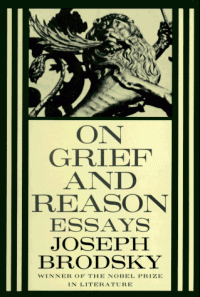 These essays were outstandingly written in my opinion, because they explored ideas which were not familiar to me prior to the time of reading. Being a huge fan of Anna Akhmatova's poetry, I didn't take long to decide whether I liked or disliked Brodsky's style of essay-writing (my decision was the former one, naturally). I really enjoyed observing the result of Akhmatova's mentoring in Brodsky's work, whose obvious characterisitcs were the refusal of opting for any kind of symbolism, vulgar or not vulgar, to illustrate his points, a certain economy of writing, apparent lack of gruelling emotion, and his ever apparent refernces to boredom. None of his essays were dedicated entirely to personal emotion, but neither were they devoid of a human conscience, which is a trademark feature of Akhmatova's poetry.
These essays were outstandingly written in my opinion, because they explored ideas which were not familiar to me prior to the time of reading. Being a huge fan of Anna Akhmatova's poetry, I didn't take long to decide whether I liked or disliked Brodsky's style of essay-writing (my decision was the former one, naturally). I really enjoyed observing the result of Akhmatova's mentoring in Brodsky's work, whose obvious characterisitcs were the refusal of opting for any kind of symbolism, vulgar or not vulgar, to illustrate his points, a certain economy of writing, apparent lack of gruelling emotion, and his ever apparent refernces to boredom. None of his essays were dedicated entirely to personal emotion, but neither were they devoid of a human conscience, which is a trademark feature of Akhmatova's poetry.I couldn't help but be reminded of Akhmatova's omnipresent theme of 'eternal boredom' in Brodsky's essay regarding boredom. Akhmatova's suggestions that languor can lead to a flashflood of fresh, novel ideas seemed to be transliterated by Brodsky's philosophy, which postulated that boredom is inevitable, because life is a means of repition, since repetion is boring to the human mind, but boredom cannot be combated by the various means of entertainment and variation invented by our species. Boredom must be embraced, in his opinion, because it helps us to acknowledge that we are creatures only of a limited lifespan, and confirms our insignificance. However he supposes that finite things have more capacity for compassion, joy, emotions and all the other pleasures of life than things which are infinte, which at first puzzled me then started to make perfect sense. In a way, that charged me with motivation, what I really need at the moment, and what I least expected from this book.
I had to sympathise also with his pleas throughout the book to somehow allow poetry to develop the status it deserves in the public's imagination. Indeed people who understand poetry are not as common as ,say, fans of novelists. I agree with what he says about poetry requiring a special type of literacy, and is not at all an optional skill to attain, because poetry, to quote from Sylvia Plath's "The Bell Jar" is not a speck of dust; it can cover a great amount of perspective in a few lines, and they are full of meaning. I don't think that poetry is any worse than prose, despite opinions that prose is less negligent of emotion than poetry.

This was quite a change from "The Day of The Triffids". Although the two books are very similar in the ways that they share identical themes, for example post-apocalyptic survival, alien agents which threaten human survival, human naivety (in both books it partly contributes to the disastrous swelling of the scale of the apocalypse-the nuclear bombs which did not go off standing by the satellite radiation) and of course the Cold War, I enjoyed the "Kraken Wakes" much more because of its more rational and scientific approach to the book's premise, which ensured a more fluid and therefore enjoyable read. In "The Day of The Triffids" the premise was far simpler and involved quite an awkward fumbling about with various unknowns, only two of which were explained at its rather abrupt conclusion.
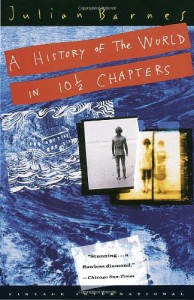 I enjoyed the book more than I actually expected to...which is of course terrific beyond belief. I'm not saying that I agreed with the most part of the ideas and beliefs presented in this book, but I was impressed by the authenticity and fluidity in which the book was written. It was devastatingly definitive, had a very personal air, which made the reading feel like reading a close friend's diary, and very unsettling. I enjoyed the unsettling because very few books are able to totally unsettle me, to the point where I feel depressed and ashamed for a full half hour, not of myself, but of the entire human race, without realising my emotional state until this fat sinkhole of a half hour has passsed. I was really mesmerised by the historical theme of the book- I love history as well as good storytelling, so the book was a perfect mixture for me in terms of interest.
I enjoyed the book more than I actually expected to...which is of course terrific beyond belief. I'm not saying that I agreed with the most part of the ideas and beliefs presented in this book, but I was impressed by the authenticity and fluidity in which the book was written. It was devastatingly definitive, had a very personal air, which made the reading feel like reading a close friend's diary, and very unsettling. I enjoyed the unsettling because very few books are able to totally unsettle me, to the point where I feel depressed and ashamed for a full half hour, not of myself, but of the entire human race, without realising my emotional state until this fat sinkhole of a half hour has passsed. I was really mesmerised by the historical theme of the book- I love history as well as good storytelling, so the book was a perfect mixture for me in terms of interest.The book was basically composed of these 10.5 chapters in which different historical events were probed into and explored scrupulously, with the author fearlessly displaying his personal opinions, beliefs and sharp wit, for example creating an image of a tidy blue sky in the U.S being "rented from Universal studios", "...and so it rained for forty days and forty nights-that would be an English summer- in my opinion, it rained for over a year", amongst others. Barnes wrote his book from an unmistakeable atheist perspective, often ridiculing Christian beliefs and so-called Christians (whose vulgar actions I would not sympathise with, being a devout Christian myself) as well as true Christians. He did not believe in any sort of higher being, clearly stating that God was something man had created in order to worship something in the need of approval and a higher leadership, and believed that science and religion could never be compatible. I disagreed with that opinion- I've always believed science exists to expand man’s objective understanding of the surrounding physical world(s) and every mechanical thing in it, while religion exists to enhance man’s spiritual awareness, self-discovery, his nature, and his relationship/link to his Creator. They can quite efficiently exist side by side. However, I fully agreed with the meaning of human nature he proposed, as well as his belief of the reason love is needed on this Earth- precisely because it is not necessary, paradoxically. I felt that the most sobering part of the book was the ending, which practically summarised what he had explored in the book- and was rather bitterly, yet salubriously, sobering.
 1
1
 I found this biography an exceptionally informative and entertaining piece of reading. I learned a significant amount about the legendary Kiwi comedian Billy T. James' life, personality and career, and highly appreciated the snippets of of James' finest comic sketches tossed into this wonderful pastiche at various stages, which served not only to entertain the reader but to serve as a link between the author's research of the James' background and the jokes that James cracked. I also had to highly appreciate the candour in which the author, a stand-up comedy veteran, wrote the book. I find that when all too often when non athletes/ performers take on writing boigraphies about performers and athletes, they often fail to understand how difficult it actuallly is and how much work is requiredin order to be able to perform effectively, which frustrates me as a competitive sportsperson. Elliott completely empathises James' shortcomings, when he had them, and understands the mechanics working behind the entertainment industry, which made the book all the more interesting and comfortable to read.
I found this biography an exceptionally informative and entertaining piece of reading. I learned a significant amount about the legendary Kiwi comedian Billy T. James' life, personality and career, and highly appreciated the snippets of of James' finest comic sketches tossed into this wonderful pastiche at various stages, which served not only to entertain the reader but to serve as a link between the author's research of the James' background and the jokes that James cracked. I also had to highly appreciate the candour in which the author, a stand-up comedy veteran, wrote the book. I find that when all too often when non athletes/ performers take on writing boigraphies about performers and athletes, they often fail to understand how difficult it actuallly is and how much work is requiredin order to be able to perform effectively, which frustrates me as a competitive sportsperson. Elliott completely empathises James' shortcomings, when he had them, and understands the mechanics working behind the entertainment industry, which made the book all the more interesting and comfortable to read.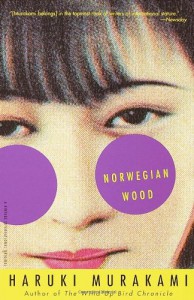 I was unable to feel any sort of feeling, either positive or negative, regarding this book, as I didn't particularly enjoy the storyline itself and was unable to relate to the situations and personalities expressed here. I think it would not be an unreasonable idea to read the book again in a few years time, with new experiences allowing me to comprehend new concepts and percept certain things better. At this stage I couldn't see past the bleak facade of a morbid romance, or understand the book's meaning.
I was unable to feel any sort of feeling, either positive or negative, regarding this book, as I didn't particularly enjoy the storyline itself and was unable to relate to the situations and personalities expressed here. I think it would not be an unreasonable idea to read the book again in a few years time, with new experiences allowing me to comprehend new concepts and percept certain things better. At this stage I couldn't see past the bleak facade of a morbid romance, or understand the book's meaning.
 I would recommend this book to anyone who is interested in personal aspects of David Lange’s life- his youth, family, marriages and health issues. He gives a very comprehensive account of his life as a person, not a politician.
I would recommend this book to anyone who is interested in personal aspects of David Lange’s life- his youth, family, marriages and health issues. He gives a very comprehensive account of his life as a person, not a politician. To be honest I had expected some more personal insight into the policies he had initiated during his term as prime minister. In this book he mentioned the most significant policies he had approved as a prime minister, including his controversial decision to break the ANZUS treaty, but declined to elaborate further on these matters. That slightly irked me. But otherwise it was a pleasant autobiography to read, not particularly remarkable in any way.
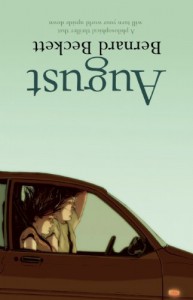 I am certain my mind will continue to linger over this tale for quite some time afterwards. I really enjoyed Beckett's idea of mixing philosophy and physics together- I think the author did a pretty good job of it overall.
I am certain my mind will continue to linger over this tale for quite some time afterwards. I really enjoyed Beckett's idea of mixing philosophy and physics together- I think the author did a pretty good job of it overall. The philosophy I referred to concerned that of the human soul, to why the 'children of the night' (aka street kids) are regarded as soulless in this dystopian society, as well as the difference between 'deciding' and 'acting, 'freedom' and 'will' (or whether there is a difference at all), along with others . The book explored the idea of whether following your instinct and sense of fighting against injustice is an action of freedom or not, and if so why it is so. I was impressed by this book because it did not finish predictably, and ironically I began to feel like the character's dilemma was being reflected back on to me as I read this book. Read the book yourself, and you'll discover what I mean.
 This was an unusually short autobiography, but very succinctly written with neither an excess nor lack of detail. I did not know of the author prior to reading the book, but I admired her after finishing it. Huata was the daughter of a father who was known primarily for his noble deeds as part of the Maori Battallion during the First World War, but who she says also inspired her to become educated and fight for Maori rights. He had a great capacity for learning languages, even translating Homer's Illiad from Latin into Maori, and encouraged her to also obtain knowledge as she could. But he also reminded her every day of Maori statistics, of how poorly they were doing as compared to Pakeha. Despite his violent manner, Donna did not fall into a spiral of violence-influenced lifestyle decisions as her sisters did, and so her journey began...
This was an unusually short autobiography, but very succinctly written with neither an excess nor lack of detail. I did not know of the author prior to reading the book, but I admired her after finishing it. Huata was the daughter of a father who was known primarily for his noble deeds as part of the Maori Battallion during the First World War, but who she says also inspired her to become educated and fight for Maori rights. He had a great capacity for learning languages, even translating Homer's Illiad from Latin into Maori, and encouraged her to also obtain knowledge as she could. But he also reminded her every day of Maori statistics, of how poorly they were doing as compared to Pakeha. Despite his violent manner, Donna did not fall into a spiral of violence-influenced lifestyle decisions as her sisters did, and so her journey began...I liked the way Donna eloquently spoke about the flaws that plagued and continue to plague New Zealand's justice system, education system and biracial relations. She spoke of her memories like as if they had all occurred yesterday, without faltering at any point. I Albeit many things she discussed in the book were quite morbid, she managed to balance it with witty reflections on former situations. Reflecting upon her childhood she stated, “My mother had no concept of bills- she would stick a 5-pound note into the fees envelope and send it back...in retrospect, I must have been a godsend to the teachers at St. Peter's, who arrived to New Zealand to teach natives but instead ended up teaching the Smith and Caughey girls”.
 The book was sort of alright, but didn't take very much to my fancy because of the rather subtle premise it founded. I liked the idea of man-eating plants, but I had hoped the mysteries presented at the start of the book would unravel themselves in a much more conspiring manner, and at the end of the book many of the unknowns presented at the start still hadn't been covered. It ended quite as I had expected, in a straightforward way. At least the theme was interesting.
The book was sort of alright, but didn't take very much to my fancy because of the rather subtle premise it founded. I liked the idea of man-eating plants, but I had hoped the mysteries presented at the start of the book would unravel themselves in a much more conspiring manner, and at the end of the book many of the unknowns presented at the start still hadn't been covered. It ended quite as I had expected, in a straightforward way. At least the theme was interesting.In my opinion, the author seemed to try to convey the idea that human civilisation is much more superficial than nature, no matter how advanced it may seem. In this book an entire world collapses simply because of a human invention which was exploited by means of human greed, by a seemingly insubstantial number of people. It explores the idea how much humans have lost general survival skills even less than a century into modern times- many of the survivors of the catastrophe had not the faintest idea of how to manage a house without use of pre-packaged materials and mains power, grow their own food by farming or even cook a simple meal. Thus they seem to have gone 'out of nature'. A year after the catstrophe the main character returns to London to discover all the buildings have crumbled apart without maintenance, with plants thriving on the decay. When he visits the seaside, he sees that the seaside bungalows have succumbed to a no less relentless fate, all deteriorating and grass ravaging the once kempt cottage gardens- "Can you imagine that once these bungalows were said to be ruining the countryside?". The man-eating plants, the triffids, despite their sudden, perhaps unnatural or maybe natural, advantage over the humans in the comfortable ecological niche the humans dominated, are also part of nature, being carnivorous plants. If you look at it from a less sympathetic-towards-our-species attitude, you would think that these modern humans were a bit like dinosaurs, perfectly complacent in the idea that there were no natural land predators other than themselves and therefore allowed themselves to completely forget the survival skills their ancestors once had when they lived in the wilderness, and they allowed themselves to forget how vulnerable they were once even one part of their five senses were irrevocably lost. However these people, unlike the dinosaurs, inflicted damage among themselves by their own accord and folly, by exploiting an undeveloped invention out of pure greed, then once they realised the triffids could pose a threat some small-scale protection was made, but satisfactory, large-scale measures were not taken, and people who spoke of a large-scale disaster were ignored simply because of the lack of convenience that would provide. So, ironically, nature takes its revenge in this way. The niceties and other laws of society are all destroyed. But still, humans are different from dinosaurs in the way that are able to physically adapt to new conditions, better than any other species, so that still leaves some sort of hope...
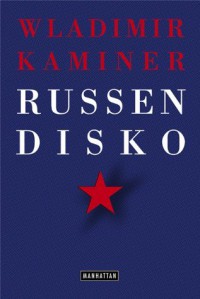 At first I was expecting a novel out of this book, mistakenly believing it was one, so I was very much surprised when I discovered it was more like an autobiography, with various short snippets of life in 1990’s Berlin as well as Russia just prior to the fall of the Iron Curtain. What made the book interesting was that it was not written from a German point of view, but from an authentically Russian perspective. It not only included the author's experiences, but also the experiences of other expatriate Russians in Berlin, which made for variety. I would have considered it autobiographical if it weren't for the remarkable lack of speckless statements apparent in the book (which I would have expected from any biography or autobiography). However it did not have a heavy, affirmative air like that of a memoir. I would not recommend it if you want a concise, informative handbook about Berlin in the 90's; I believe there are old editions of travel guides for that. It was certainly entertaining, with anecdotal humour which anyone can comprehend; slightly satiric at times but not generally. Therefore it read like a well-written short story collection, and impressed me with the author’s remarkable capacity to reduce his memories into a succinct, storytelling format.
At first I was expecting a novel out of this book, mistakenly believing it was one, so I was very much surprised when I discovered it was more like an autobiography, with various short snippets of life in 1990’s Berlin as well as Russia just prior to the fall of the Iron Curtain. What made the book interesting was that it was not written from a German point of view, but from an authentically Russian perspective. It not only included the author's experiences, but also the experiences of other expatriate Russians in Berlin, which made for variety. I would have considered it autobiographical if it weren't for the remarkable lack of speckless statements apparent in the book (which I would have expected from any biography or autobiography). However it did not have a heavy, affirmative air like that of a memoir. I would not recommend it if you want a concise, informative handbook about Berlin in the 90's; I believe there are old editions of travel guides for that. It was certainly entertaining, with anecdotal humour which anyone can comprehend; slightly satiric at times but not generally. Therefore it read like a well-written short story collection, and impressed me with the author’s remarkable capacity to reduce his memories into a succinct, storytelling format.
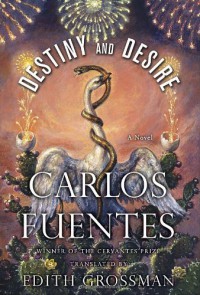 I enjoyed the philosophical aspects of this novel, which although demanded some elementary knowledge of classic idealogy and philosophy, it cannot be said that it is a mere compilation of these ideas prettily agglomerated into a superficially carved text. This is because the philosophy and idealogy is convincingly interpreted by two very interesting characters, Mexican youth who strive to grow intellectually oblivious to the frivolities of the present age. It was an emotional and for that reason an enjoyable experience (at least for me) to read about their perpetual perceptions of their country and the world, fearless of scaling new and untapped for decades (in their youthful opinion, relatable only too well to mine) dimensions of human intellect. The two young people meet at a school playground, one of them coming to the defense of the other when he was being bullied about his physical appearance, immediately after being acquainted with the other declaring "We’ll get along like clockwork". They have a fraternal friendship, partly because of the mystery surrounding their ancestral backgrounds, and also because of their search for the meaning of life and its institutions without being frivolous, with questions such as "Why is Protestantism the ideal religion for capitalism?"
I enjoyed the philosophical aspects of this novel, which although demanded some elementary knowledge of classic idealogy and philosophy, it cannot be said that it is a mere compilation of these ideas prettily agglomerated into a superficially carved text. This is because the philosophy and idealogy is convincingly interpreted by two very interesting characters, Mexican youth who strive to grow intellectually oblivious to the frivolities of the present age. It was an emotional and for that reason an enjoyable experience (at least for me) to read about their perpetual perceptions of their country and the world, fearless of scaling new and untapped for decades (in their youthful opinion, relatable only too well to mine) dimensions of human intellect. The two young people meet at a school playground, one of them coming to the defense of the other when he was being bullied about his physical appearance, immediately after being acquainted with the other declaring "We’ll get along like clockwork". They have a fraternal friendship, partly because of the mystery surrounding their ancestral backgrounds, and also because of their search for the meaning of life and its institutions without being frivolous, with questions such as "Why is Protestantism the ideal religion for capitalism?"However they cannot escape from the reality of Mexico’s criminal dependent democracy, and an ubiquitous theme in the book therefore is crime, sex and corruption, and how each of these manipulate and mock criminals as well as those who by destiny and ill desire become linked to crime, an example of the former being children in Mexico City's largest prison, who are pulled to crime against their will. The wish of the two youth to somehow develop intellect and practice it in their desired way conflicts with this. As a result: "Power does not commit hari-kiri. Power defends itself. "
The thing that bothered me was that the book had no underlying meaning, but rather underscored various elements of human nature that contributed to the situation in Mexico. It seemed a very irksome waste of nearly 500 pages, effectively reflecting modern Mexico with insight, however giving the impression of a certain blandness, due to the lack of intertwined meaning which every good novel has to have to it, which I disliked.
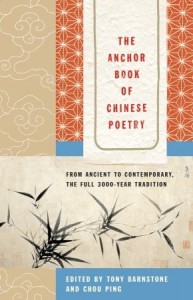 I think that this book is an ideal starting point for those interested in learning about Chinese poetry and the culture that influenced it, because this book does not merely present a collection of any sort of Chinese poetry, but organises poetry into historical order, and includes a preface and introduction to each chapter explaining how the different dynasties (with their varying levels of stability), and the national faiths and philosophy, which were influenced by the ideals of Confucius, Daoism and Buddhism gradually over time, contributed overall to the Chinese poetic movements' evolving moods and works. Perhaps the most important aspect of Chinese poetry, which was probably overwhelmingly obvious but which I had at first found very surprising since I had considered before that poetry could be a medium to express balance and symmetry, was the Ying Yang philosophy, which demanded that poetry must have an evenly spread theme, so that each stanza balances the other and also that the poem has no more than a two-beat rhythm. To my surprise, such a technique did not cut out any emotion or reduce its meaning.
I think that this book is an ideal starting point for those interested in learning about Chinese poetry and the culture that influenced it, because this book does not merely present a collection of any sort of Chinese poetry, but organises poetry into historical order, and includes a preface and introduction to each chapter explaining how the different dynasties (with their varying levels of stability), and the national faiths and philosophy, which were influenced by the ideals of Confucius, Daoism and Buddhism gradually over time, contributed overall to the Chinese poetic movements' evolving moods and works. Perhaps the most important aspect of Chinese poetry, which was probably overwhelmingly obvious but which I had at first found very surprising since I had considered before that poetry could be a medium to express balance and symmetry, was the Ying Yang philosophy, which demanded that poetry must have an evenly spread theme, so that each stanza balances the other and also that the poem has no more than a two-beat rhythm. To my surprise, such a technique did not cut out any emotion or reduce its meaning.The Chinese tradition of simplicity in poetry was explained by the quote of Daoist philosopher Zhuangzhi, "The Fish trap exists because of the fish; once you've gotten the fish you can forget the trap...Words exist because of meaning; once you've got the meaning you can forget about the words. Where can I find a man who has forgotten words so I can have a word with him?" In my new opinion, gained through a pair of eyes which had never seen this type of poetry before, simplicity and minimalism are very effective mediums to convey the message of poetry, because the meaning is not at all obvious upon quickly skimming the words. In order to fully appreciate the essence of the traditional chinese poem, a considerable amount of patience is required, as well as the ability to fully empty your mind of any cluttering thoughts from elsewhere, then enough imagination to venture into the poem, not with the fierce, bold attitude you would expect of a superhero but with the impersonified audacity commonly attribute to philosophers and followers of monasticism, then carefully visualise the results of doing so. I realised the constraints of following this process immediately, which somewhat made me less excited about reading the book. It left it for a couple of days before thinking, what exactly is my problem? Although reading the book took more time than I initially expected, the rewards that came with developing the skill of close reading of Chinese poetry seemed to me more than sufficient- at last I could understand the text in front of my eyes. As the author advises, " Sometimes we can't find it just by looking; we also have to see. Sometimes we can't find it just by trying; it comes to us while we're doing something else." In personal experience, the special meaning, ironically, all too often came when I was feeling my dullest- such as the flat languor everyone feels after a tedious day of work.
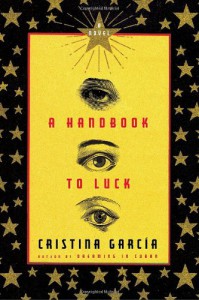 This book was about three seemingly mediocre people, but with interesting problems and dilemmas,and how each of their lives intersected, all by coincidence-A Cuban boy with an apparent gift for mathematics, a magician father, and the legacy of his deceased mother (who was killed during a performance with his father); An Iranian girl from a wealthy family; a poor woman from El Salvador. I enjoyed the book partly because of the historical themes- many events in the book and attitudes are from times I am certain I will never experience, made to be easily immersed in by Gracia's fluid, concise prose. The book deals with the irony of fate, the erroneous nature of love and various personal issues, often psychological. Gracia deals with her deep themes neither heavily nor lightly- the effect is that the book is not one you are likely to mull over for a time afterwards, which I admittedly indulge in from time to time...
This book was about three seemingly mediocre people, but with interesting problems and dilemmas,and how each of their lives intersected, all by coincidence-A Cuban boy with an apparent gift for mathematics, a magician father, and the legacy of his deceased mother (who was killed during a performance with his father); An Iranian girl from a wealthy family; a poor woman from El Salvador. I enjoyed the book partly because of the historical themes- many events in the book and attitudes are from times I am certain I will never experience, made to be easily immersed in by Gracia's fluid, concise prose. The book deals with the irony of fate, the erroneous nature of love and various personal issues, often psychological. Gracia deals with her deep themes neither heavily nor lightly- the effect is that the book is not one you are likely to mull over for a time afterwards, which I admittedly indulge in from time to time...


